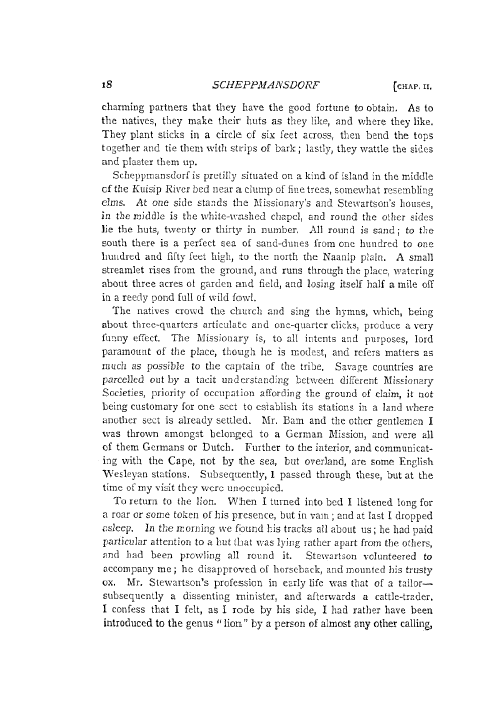18 SCHEPPMANSDORT [CHAP. rr.
charming partners that they have the good fortune to obtain. As to the natives, they make their huts as they like, and where they like. They plant sticks in a circle of six feet across, then bend the tops together and tie them with strips of bark ; lastly, they wattle the sides and plaster them up.
Schcppmansdorf is pretily situated on a kind of island in the middle of the Kuisip River bed near a clump of fine trees, somewhat resembling elms. At one side stands the Missionary's and Stewartson's houses, in the middle is the white-washed chapel, and round the other sides lie the huts, twenty or thirty in number. All round is sand; to the south there is a perfect sea of sand-dunes from one hundred to one hundred and fifty feet high, to the north the Naanip plain. A small streamlet rises from the ground, and runs through the place, watering about three acres of garden and field, and losing itself half a mile off in a reedy pond full of wild fowl.
The natives crowd the church and sing the hymns, which, being about three-quarters articulate and one-quarter clicks, produce a very funny effect. The Missionary is, to all intents and purposes, lord paramount of the place, though he is modest, and refers matters as much as possible to the captain of the tribe, Savage countries are parcelled out by a tacit understanding between different Missionary Societies, priority of occupation affording the ground of claim, it not being customary for one sect to establish its stations in a land where another sect is already settled. Mr. Barn and the other gentlemen I was thrown amongst belonged to a German Mission, and were all of them Germans or Dutch. Further to the interior, and communicating with the Cape, not by the sea, but overland, are some English Wesleyan stations. Subsequently, I passed through these, but at the time of my visit they were unoccupied.
To return to the lion. When I turned into bed I listened long for a roar or some token of his presence, but in vain ; and at last I dropped asleep. In the morning we found his tracks all about us; he had paid particular attention to a but that was lying rather apart from the others, and had been prowling all round it. Stewartson volunteered to accompany me; he disapproved of horseback, and mounted his trusty ox. Mr. Stewartson's profession in early life was that of a tailorsubsequently a dissenting minister, and afterwards a cattle-trader. I confess that I felt, as I rode by his side, I had rather have been introduced to the genus "lion" by a person of almost any other calling,

